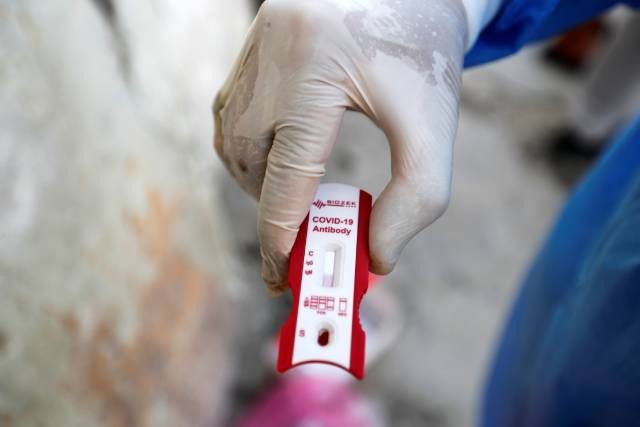
Despite proofs that tell otherwise, presidential spokesperson Harry Roque maintained his position that he did not announce the national government has no mass testing plans in the country.
Roque made conflicting statements early this week regarding the government’s plans to ramp up its COVID-19 detection program in the country, wherein he both mentioned the terms “mass testing” and “expanded targeted program” in his virtual press briefings.
On May 21, Roque took to social media to respond to Sen. Risa Hontiveros who asked him to clarify and retract his statement about having no official large-scale testing protocols, saying he did not mention it in the first place.
“Senadora, kung ako po ay nagkamali, babawiin ko pero hindi po ako nagkamali dahil walaakong ganoong sinabi,” Roque said.
Sinabi po ni Sen. Risa Hontiveros na dapat kong bawiin ang sinabi ko na wala tayong mass testing sa Pilipinas. Senadora, kung ako po ay nagkamali, babawiin ko pero hindi po ako nagkamali dahil wala akong ganoong sinabi. (1/3)
— Harry Roque (@attyharryroque) May 21, 2020
He reiterated his previous statements on expanded targeted testing, which was the measure the government will perform instead of mass testing.
“Ang sinabi ko po, hindi natin ginagawa ang ginagawa ng Wuhan kung saan tine-testing po ang lahat ng kanilang mamamayan. Ang atin po ay expanded targeted testing kung saan ang tine-test po natin ay 1-2% ng ating populasyon at sa mga epicenters gaya ng Metro Manila, ite-test po natin ang 10%,” Roque said.
To recall, during the virtual press briefing on May 18, Roque announced that the government has no “mass testing” plans on the same scale in Wuhan, China, wherein its own government planned to test all its 11 million citizens. Wuhan is considered the epicenter of the highly communicable virus which causes COVID-19.
In that context, Roque erroneously defined mass testing as carrying out the COVID-19 tests to the entire population of the Philippines.
However, according to health experts and authorities, mass testing refers to widespread tests of suspected cases, such as persons under investigation and monitoring, and health workers and other frontliners, aggressive contract tracing, and then the treatment.
Last Monday, Roque drew backlash on local Twitter for his mass testing remarks as it also came amid the public’s clamor for mass testing. This has been the public’s cry since the start of the quarantine measures last March and it persisted when the government started easing restrictions on travel and movement in various areas in the country.
The term ‘mass testing’ is correct
Dr. Gene Nisperos, assistant professor at the University of the Philippines College of Medicine, on Wednesday argued in a Facebook post that the term “mass testing” is correct.
The term “mass testing” is correct and government’s insistence on changing it to “expanded and targeted testing” is…
Posted by Gene Nisperos on Wednesday, May 20, 2020
He noted that the term had been used from the start by proponents of this initiative, wherein they sought detection, containment, and isolation.
“Even from its inception, the call for “mass testing”, exemplified by #FreeMassTestingNow and various permutations thereof, meant much more testing than that being done by the government. It had a purpose and very clear targets as to who should be tested. The objectives were very clear: identification, containment, and isolation of cases, all taken together,” Nisperos said.
“For proponents of “mass testing”, those who should be tested at the start of the campaign were also very clear: patients with COVID-19 symptoms (all Persons Under Investigation/PUIs), frontline health workers, and members of communities with confirmed COVID-19 cases. Persons Under Monitoring (PUMs) were included as the campaign was further polished later,” he added.
Nisperos recalled that the public was confused at first, however, they gained awareness of the process that “mass testing” entail during the duration of the quarantine.
He also criticized anew the alleged VIP testing of government officials and their relatives, including President Rodrigo Duterte, and the Department of Health’s sudden change of protocols or triage system in classifying COVID-19 patients.
The doctor also perceived that the government might only be seeking to confirm COVID-19 cases and not its prevention, which he described as “problematic.”
“In medical school, students are taught that once a clinical diagnosis is reached, through proper history-taking and physical examination, diagnostic tests are mainly confirmatory. The DOH is basically applying this to the COVID-19 pandemic, which is wrong and problematic,” he explained.
“By focusing only on those with overt symptoms already, testing is largely confirmatory of whether the case is indeed COVID-19 or not. There is no preventive or public health role of testing in this,” he added.
The term “mass testing” is also used by the World Health Organization and the DOH to refer to the need to detect COVID-19 patients as part of the process to “flatten the curve” or reduce the number of cases to a manageable level.
(Editor’s note: An earlier version of this article referred to Dr. Gene Nisperos as “she.” This has been corrected.)









